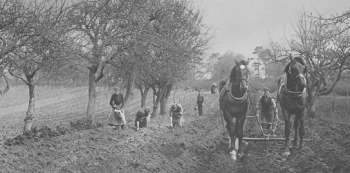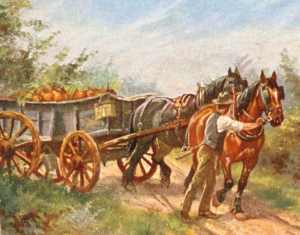Farm Labouring in 1840
When reading census records for East Essex by far the most common occupation listed was that of agricultural labourer especially in the rural areas.
This trade was passed on
from generation to generation often for the same landowner.

In 1900 the Essex Review
carried an account of life as a Essex farm labourer in 1840 which
may help us to understand what the life of our ancestors was like.
Those were the days of the smock frock- a worn and shabby one for
everyday, a better one, of a soft greenish hue, for Sundays. This in
turn descended to the weekday wear and very likely to another and
third generation. The smock was a comprehensive garment that reached
below the knees. The farm labourer's lower extremities being cased
on Sundays in short brown leather buskins, which met the hem of the
smock. The wives of the farm men appeared on Sundays in large
circular cloaks that enveloped their spare figures. At the time of
which I am writing, scarlet ones were getting few and far between,
but the little bit of colour seen across the common under the
ancient lime trees was a most picturesque sight.
Implements were then very scarce upon the farms. Hardly any of the
farmers had even drills of their own. To possess a drill, or more
than one, and take it round the neighbourhood, or let it out to
farmers, was a trade in itself.
All
the wheat was threshed by a flail upon the barn floors, and
comfortable warm work it was during the long, cold winter. The
flip-flop of the flails is still as fresh as possible in my memory.

Machinery was being introduced but most farms used real horsepower
Those who only have to pay a penny for their letters to any part of
the United Kingdom or the Colonies, would have perhaps begrudged the
five pence necessary to frank a letter. Three times only each week
did letters find their way from our village, from which year after
year a weather beaten old dame travelled on foot to the town and
back, laden with many things besides letters. One winter morning she
was found frozen to death in the watery lane.
There was no putting the washing out in those days, but every
farmhouse had its grand washing days, when the women started work at
4 o clock in the morning, in fact some of them came over night.
Strange as it may seem now they would stand all day at the wash tub
or copper, rubbing and wringing (there were no wringing machines)
and would go home at night well satisfied with receiving something
under a shilling and their meals.
The
game on our farms was carefully preserved by the landlord, whose
visits we children highly appreciated, for the sake of brand new
shillings or sixpences, which the old banker brought in his pocket
from Lombard Street. He was invariably dressed in light short jacket
reaching only to his waist, and worn outside his coat. This garment
was called a Spencer after Lord Spencer, who as Lord Althorp, had
been chancellor of the Exchequer in 1830. If the old landlord came
in his whiskey ( a light two wheeled conveyance for one horse) we
were more than delighted especially if he drove it in the horse that
had such an appropriate name. Brought to the stables one day when he
was in his , most decisive mood he had scarcely set eyes upon it
before rapping out in his abrupt way ' what's the price?' 'Fifty
guineas' said the owner promptly. ' I'll have it' came quickly in
reply and the animal was forthwith named Moment. His
coachman at the same time was one Moses and the old Squires order: '
Tell Moses to put Moment in the whiskey', which we children heard
repeated, seemed to use almost of biblical importance.
These are only a few rambling reminiscences of sixty years ago but
yet enough to show the rising generation in what a different age
from that of our childhood they have opened their eyes.



